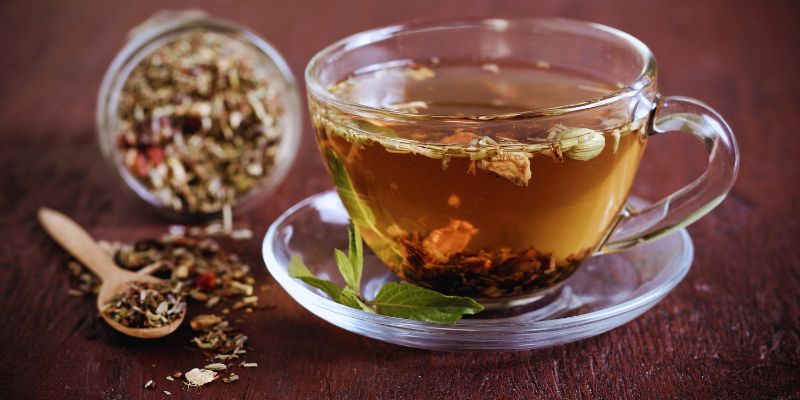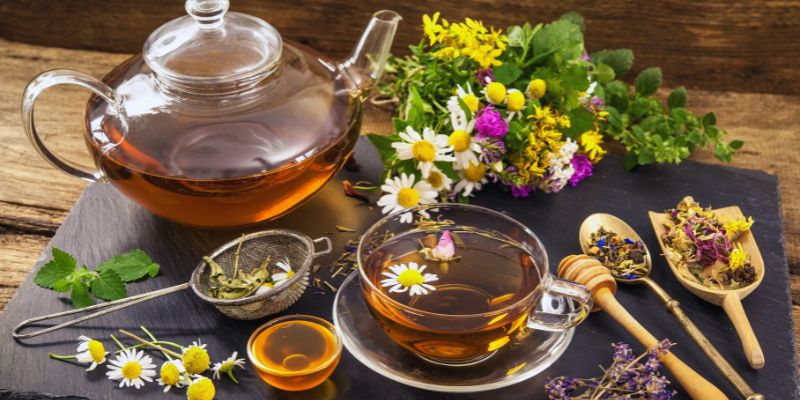Oolong tea, rich in antioxidants, is the most consumed tea in China and Taiwan. It is fermented using a unique process. It is left in the sun for the day to oxidize and become dark and flavourful, but less so than black tea. It lies between green tea and black tea.
With its unique texture and taste, it brings tremendous benefits to your health. These include improving heart health, cholesterol levels, brain health, dental health, and bone health, aiding in body fat reduction, preventing type 2 diabetes, and preventing cancer. Read on to learn more about how oolong tea helps make your body healthy and how much oolong tea is safe to consume in a day.

What Are The Health Benefits Of Oolong Tea?
Oolong tea is native to China and Taiwan. It is a big part of Asian culture. Like green or black tea, Oolong tea comes from the same tea plant. The difference lies in how it is processed, oxidized, or fermented. Green tea is totally unprocessed and contains antioxidants called catechins. On the other hand, black tea, which is totally fermented and processed, contains antioxidants theaflavin. Oolong tea is somewhat between green and black tea. It is roasted in the sun for partial oxidation. It is more fermented than green tea but less fermented than black tea.
Oolong tea accounts for only 2% of the world's tea consumption, but it is associated with many health benefits. Read on to learn how Oolong tea may help your body stay healthy:
It May Improve Heart Health
Due to its richness in antioxidants, Oolong tea prevents heart conditions such as stroke and clogged arteries. Triglycerides, a type of fat that thickens the arteries, are reduced in oolong tea drinkers. Oolong tea reduces LDL (bad) cholesterol and hence prevents heart disease. A study showed that people who drink six cups of oolong tea per day have a significantly lower risk of developing heart conditions than non-drinkers. Another study of Japanese men showed that people who drank eight ounces of oolong tea per day had a 61% lower rate of developing bad cholesterol or heart conditions.
May Prevent Diabetes
Oolong tea has been linked to preventing type 2 diabetes. Its two main antioxidants, catechins, and polyphenols, reduce insulin resistance and inflammation. Regular tea consumption has improved blood sugar levels in patients with type 2 diabetes. Any tea, green, black, or oolong, can actually lower insulin resistance. However, studies need to be done specifically on oolong tea in this regard. A very small study on the possible benefits of oolong tea showed that it lowers plasma glucose in type 2 diabetes patients.
May Aids In Weight Loss
Tea and weight loss have been linked together for ages, and many studies have been conducted to prove the relationship between tea consumption and weight loss. The tea's antioxidants are mainly responsible for weight loss as they enhance enzyme inhibition and activate healthy gut flora. A study specifically done with oolong tea suggested that it has been directly linked with increased oxidation and body fat reduction. Moreover, it depends from person to person on how different teas may react to fat oxidation in different people; one cannot say that drinking several cups of tea will only aid in weight loss. Several factors, such as diet, lifestyle, genes, etc., may affect the rate of weight loss in different people.

May Prevent Cancer
Antioxidants in green, black, and oolong tea may help prevent cancerous cells from growing. Studies have shown the connection between tea consumption and reduced cancer risks, including lung, liver, pancreatic, esophageal, and colorectal cancers. While most research is done on green and black tea, we can safely say that its benefits also extend to oolong tea, which lies between green and black tea. More research is needed to be done on oolong tea specifically.
It May Improve Brain Function
Oolong tea may help improve cognitive function and memory and may help prevent age-related memory loss, such as dementia. Several components in the tea help in cognitive functioning. Caffeine in tea can increase mood, attention span, and, eventually, brain function. It releases two brain messengers, dopamine and norepinephrine, which help with mood and memory. Theanine, an amino acid in the tea, helps improve attention and relieve anxiety.
Studies have shown that both caffeine and theanine in tea help improve attention after 1-2 hours of consumption. Therefore, it is best to consume a cup of tea before work or brainstorming homework. A study done specifically on oolong tea suggested that high tea consumption is linked with a lower risk of brain dysfunction and cognitive decline. Black tea also does the same.
Other Benefits Of Oolong Tea Include:
Here are some other benefits of oolong tea:
- It can improve your bone health
- It may help with Alzheimer
- Tea promotes dental health
- It may help relieve eczema
- The tea may prevent Parkinson's' disease and much more
What Are The Possible Side Effects Of Oolong Tea?
For the most part, oolong tea is safe to consume for adults. But, even then, it can cause side effects in some people, for example:
- Oolong tea contains caffeine, about 10 to 60 mg per cup (8 ounces). It is safe to drink 400 mg of caffeine in a day. You may drink 6 to 10 cups of oolong tea daily without exceeding the maximum limit for caffeine consumption. But, drinking too much oolong tea may boost caffeine intake, which can lead to anxiety, insomnia, irregular heartbeat, and headaches.
- Oolong tea also contains an antioxidant called flavonoid, which may interfere with the body's iron absorption process. However, more research is needed to support this statement.
Conclusion:
Oolong tea is a traditional Chinese tea. It is partially fermented, unlike green tea, which is not fermented at all, or black tea, which is fully fermented. It lies somewhere between green and black tea. Oolong tea has several different health benefits, including improving heart health, bone health, dental health, lowering cholesterol levels, aiding in weight loss, preventing cancer, improving brain function, preventing diabetes, and much more. Though it is safe for most people to drink oolong tea, drinking more than a limited amount can cause health issues, as it contains caffeine.







